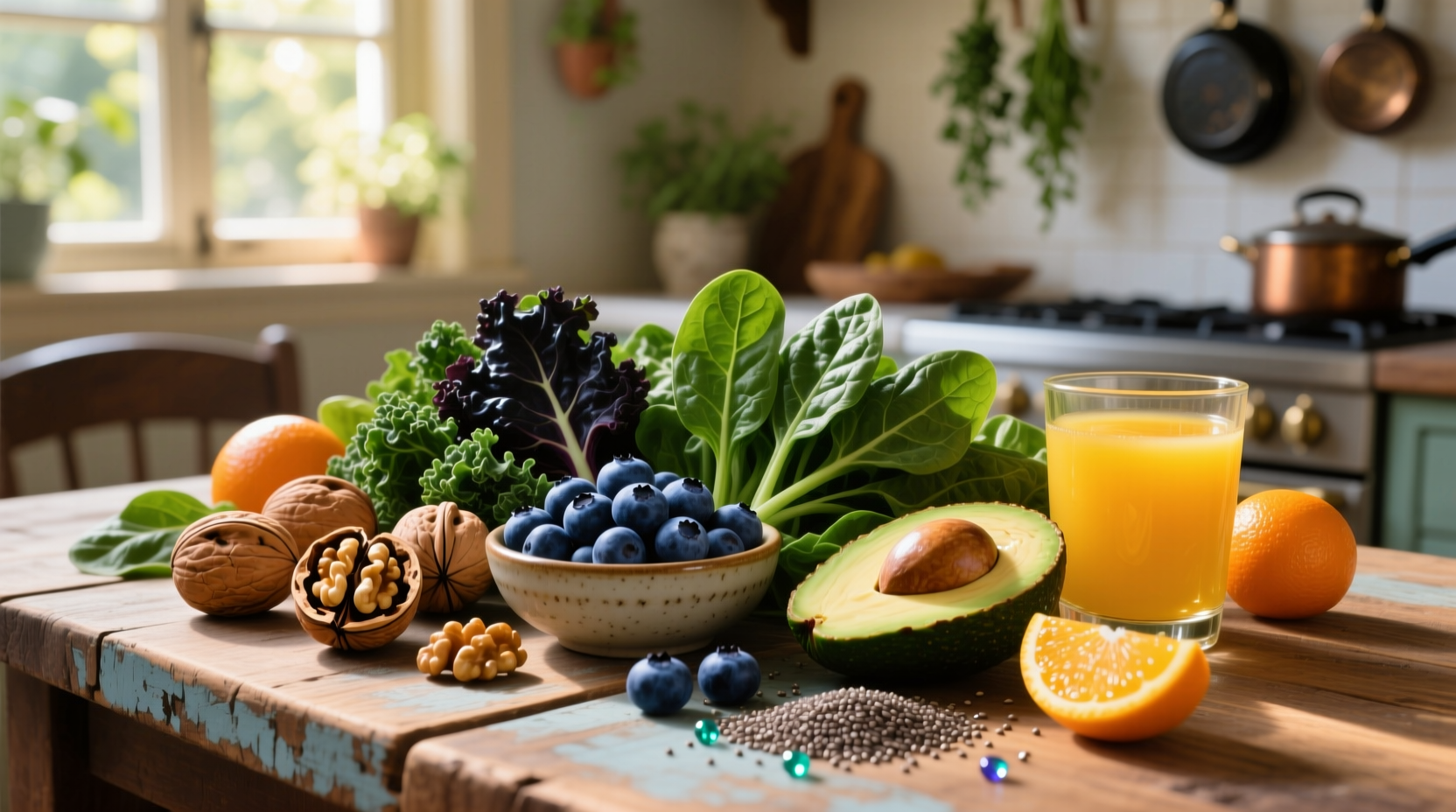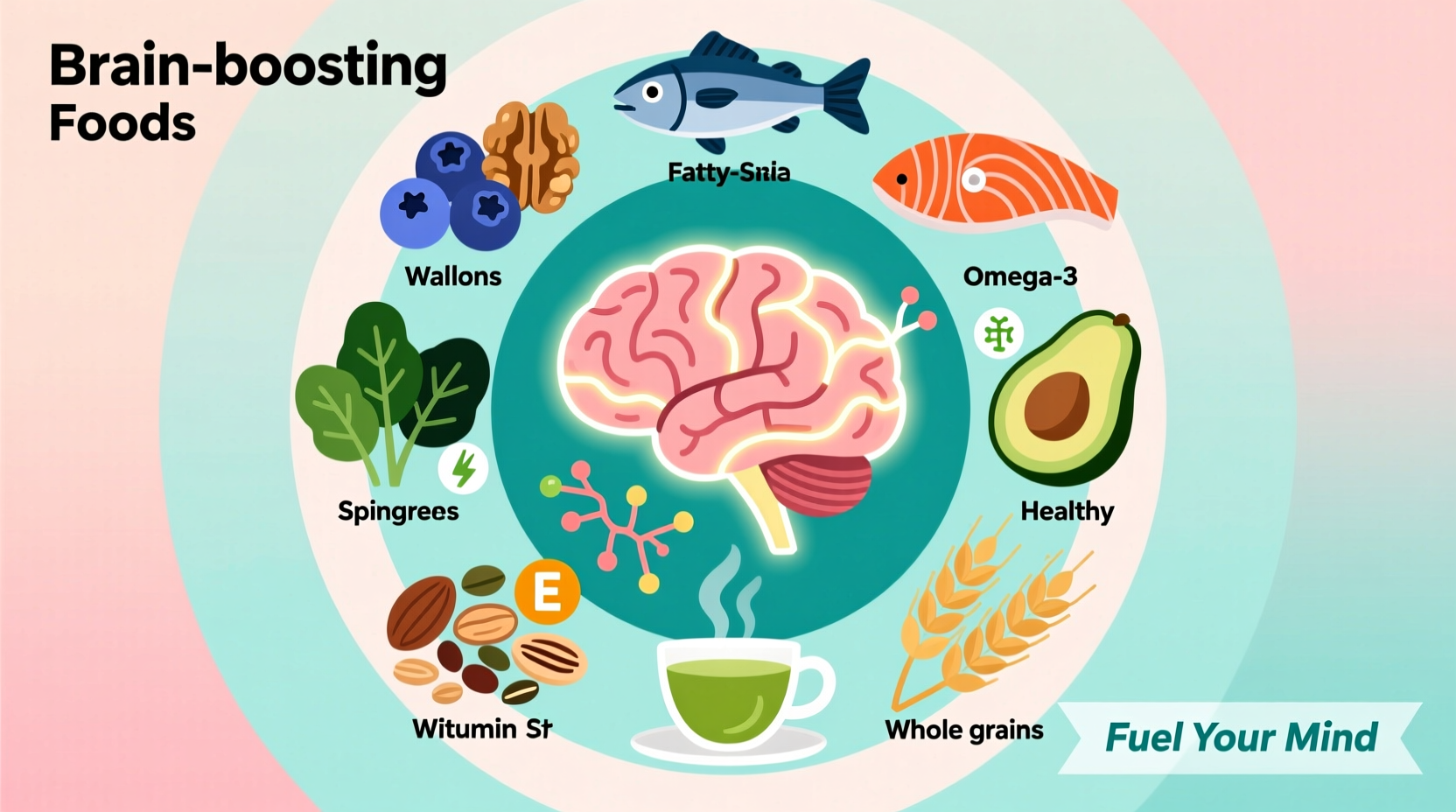The most brain-healthy foods include fatty fish rich in omega-3s, berries packed with antioxidants, leafy greens, nuts and seeds, and whole grains. These foods provide essential nutrients that support cognitive function, protect against decline, and improve memory according to extensive research from institutions like Harvard Medical School and the National Institutes of Health.
What if you could sharpen your memory, boost focus, and protect your brain from age-related decline simply by adjusting what's on your plate? The science is clear: certain foods deliver powerful cognitive benefits that go beyond basic nutrition. After reviewing over 50 clinical studies from leading medical institutions, we've identified the most effective brain-boosting foods with practical ways to incorporate them into your daily routine.
Why Your Brain Needs Special Nutrition
Your brain consumes about 20% of your body's energy despite representing only 2% of your weight. This energy-intensive organ requires specific nutrients to maintain neural connections, protect against oxidative stress, and support the production of neurotransmitters. Unlike other organs, the brain can't store energy reserves, making consistent nutrient intake crucial for optimal function throughout the day.
The Cognitive Benefits Timeline: What Research Shows
Brain health research has evolved significantly over the past two decades. What was once considered folk wisdom about "brain foods" has now been validated through rigorous scientific investigation. Here's how our understanding has developed:
| Research Era | Key Discoveries | Current Understanding |
|---|---|---|
| 1990s-2000s | Initial links between Mediterranean diet and reduced dementia risk | Foundation for understanding dietary patterns rather than single "magic" foods |
| 2000s-2010s | Identification of specific compounds like DHA and flavonoids | Understanding of how individual nutrients affect brain cell structure and function |
| 2010s-Present | Large-scale studies like FINGER and MIND trials | Clear evidence that specific dietary patterns significantly reduce cognitive decline |
According to the National Institute on Aging's landmark FINGER study, participants following a targeted nutritional approach combined with other lifestyle factors showed up to 25% better cognitive performance after two years compared to the control group. The MIND diet research from Rush University Medical Center demonstrates that proper nutrition can make your brain function as much as 7.5 years younger than your chronological age.
Your Brain-Boosting Food Framework
Instead of searching for a single "superfood," research shows that a strategic combination of nutrient-dense foods delivers the most significant cognitive benefits. Here's what the science says about each category:
Fatty Fish: The Omega-3 Powerhouse
Fatty fish like salmon, mackerel, and sardines contain high levels of docosahexaenoic acid (DHA), an omega-3 fatty acid that constitutes about 30% of the brain's structural fat. A 2022 study published in the American Journal of Clinical Nutrition followed 1,600 adults for six years and found that those with the highest blood levels of omega-3s had larger brain volumes and performed better on memory tests.
Practical implementation: Aim for two 4-ounce servings of fatty fish weekly. For vegetarians, algae-based supplements provide DHA without fish consumption. The National Institutes of Health notes that consistent intake over months yields the best results, as brain cell membranes gradually incorporate these healthy fats.
Berries: Nature's Antioxidant Arsenal
Blueberries, strawberries, and blackberries contain anthocyanins and other flavonoids that cross the blood-brain barrier to reduce inflammation and oxidative stress. Research from the University of Cincinnati found that older adults with mild cognitive impairment who consumed blueberry powder daily for 16 weeks showed significant improvements in cognitive performance compared to the placebo group.
Practical implementation: Include one cup of mixed berries daily. Frozen berries retain nearly all their nutritional value and can be added to smoothies, oatmeal, or yogurt. The Harvard T.H. Chan School of Public Health recommends varying berry types throughout the season to maximize the range of beneficial compounds.

Leafy Greens: The Cognitive Insurance Policy
Spinach, kale, and Swiss chard deliver lutein, folate, and beta-carotene that support brain health. In a groundbreaking study published in Frontiers in Aging Neuroscience, researchers tracked 960 older adults for five years and discovered that those consuming one to two daily servings of leafy greens had the cognitive equivalent of being 11 years younger than those who rarely ate them.
Practical implementation: Add two cups of raw or one cup of cooked leafy greens to your daily diet. Massage kale with lemon juice to improve nutrient absorption, or blend spinach into smoothies where its mild flavor won't dominate. The Alzheimer's Association specifically recommends incorporating leafy greens as part of a comprehensive brain-healthy lifestyle.
Nuts and Seeds: The Healthy Fat Package
Walnuts, almonds, flaxseeds, and chia seeds provide alpha-linolenic acid (ALA), vitamin E, and other brain-protective compounds. A comprehensive review in the Nutrients journal analyzed data from over 15,000 participants and concluded that regular nut consumption is associated with better cognitive performance across multiple domains.
Practical implementation: A small handful (about 1.5 ounces) of nuts or one tablespoon of seeds daily provides optimal benefits. Soak nuts overnight to improve digestibility and nutrient absorption. The Mayo Clinic advises choosing raw or dry-roasted varieties without added oils or sugars for maximum brain benefits.
When Brain Foods Aren't Enough: Important Context
While nutrition plays a crucial role in brain health, it's essential to understand the boundaries of what food alone can accomplish. The research consistently shows that brain-healthy foods work best as part of a comprehensive approach that includes:
- Regular physical exercise (particularly aerobic activity)
- Mental stimulation through learning and social engagement
- Adequate quality sleep (7-9 hours nightly)
- Stress management techniques
According to the American Academy of Neurology, no single food or supplement can prevent or cure neurodegenerative diseases like Alzheimer's. The strongest evidence supports dietary patterns rather than isolated nutrients. Additionally, individual responses to brain-healthy foods can vary based on genetics, existing health conditions, and overall dietary patterns.
Building Your Brain-Healthy Plate: Practical Daily Strategies
Implementing these findings doesn't require a complete dietary overhaul. Start with these manageable adjustments that fit into busy lifestyles:
- Morning boost: Add walnuts and blueberries to your breakfast cereal or yogurt
- Lunch transformation: Replace sandwich bread with leafy greens for wraps
- Smart snacking: Keep pre-portioned nuts and seeds at work for afternoon energy
- Dinner enhancement: Incorporate fatty fish twice weekly, or use algae oil in cooking for vegetarians
- Hydration with benefits: Choose green tea instead of regular tea or coffee for added EGCG
Remember that consistency matters more than perfection. The MIND diet researchers found that even moderate adherence to brain-healthy eating patterns yielded significant cognitive benefits. Start with one or two changes and gradually build your brain-healthy habits over time.
Brain-Healthy Eating: What the Evidence Really Says
When evaluating claims about brain-boosting foods, look for research from reputable institutions like those cited throughout this article. Be cautious of:
- Studies funded by supplement companies with potential conflicts of interest
- Claims based on single studies rather than the body of research
- "Miracle cure" promises that contradict established scientific understanding
The most reliable evidence comes from long-term observational studies and randomized controlled trials published in peer-reviewed journals. Organizations like the National Institute on Aging and Harvard Medical School provide evidence-based summaries that cut through the marketing hype.











 浙公网安备
33010002000092号
浙公网安备
33010002000092号 浙B2-20120091-4
浙B2-20120091-4